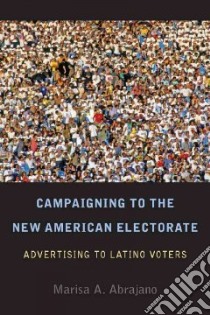Campaigning to the New American Electorate - 9780804768962
Un libro in lingua di Abrajano Marisa A. edito da Stanford Univ Pr, 2010
- € 22.40
- Il prezzo è variabile in funzione del cambio della valuta d’origine
"This is a compelling study of campaign advertising in an increasingly diverse nation. The topic is quite timely and the question of how campaigns reach out to Latino voters will continue to be a subject of great importance into the future. The book is fresh, informative, and readable." Janelle Wong University of Southern California
"This is an important and groundbreaking piece of research in an area that is badly understudied and yet of interest to a wide audience, including scholars and political practitioners. It is well known that the size and political power of Latinos in the United States is increasing dramatically. However, our understanding of how to encourage Latinos to vote as well as how to influence their vote choices is relatively unsophisticated. This study is a major step forward in filling that void in the literature." Melissa R. Michelson Associate Professor of Political Science, California State University, East Bay
Presuming that a strong relationship exists between one's identity and political behavior, American politicians have long targeted immigrant and ethnic communities based on their shared ethnic or racial identity. But to what extent do political campaign messages affect voters' actual decisions and behaviors?
This new book is one of the first to examine and compare the campaign efforts used to target Latinos with those directed at the rest of the electorate. Specifically, it focuses on televised Spanish- and English-language advertising developed for the 2000 and 2004 presidential elections, as well as for dozens of congressional and statewide contests from 2000-2004. Author Marisa Abrajano's research reveals that exposure to these televised political ads indeed affects whether Latinos turn out to vote and, if they vote, for whom. But the effect of these advertising messages is not uniform across the Latino electorate. Abrajano explores the particular factors that affect Latinos' receptivity to political ads and offers key findings for those interested in understanding how to mobilize this critical swing group in American politics.
Informazioni bibliografiche
- Titolo del Libro in lingua: Campaigning to the New American Electorate
- Sottotitolo: Advertising to Latino Voters
- Lingua: English
- Autore: Abrajano Marisa A.
- Editore: Stanford Univ Pr
- Collana: Stanford Univ Pr (Paperback)
- Data di Pubblicazione: 24 Aprile '10
- Genere: POLITICAL SCIENCE
- Argomenti : Advertising, Political United States Political campaigns United States Hispanic Americans Politics and government
- Pagine: 198
- ISBN-10: 080476896X
- EAN-13: 9780804768962


